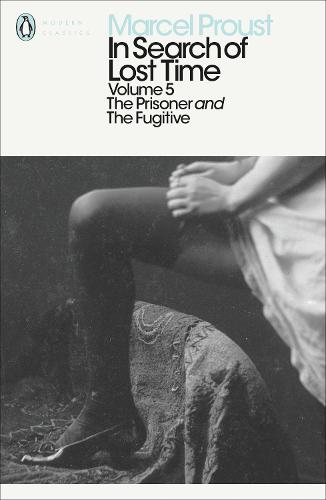
The Prisoner is the fifth of the seven books of In Search of Lost Time; my Penguin edition combines parts five and six, but I have only read up through The Prisoner. It was absolutely amazing; and I would say that either the novel as a whole has been teaching me how to read itself, or this volume is a little easier to read than some of the others. Not that you could read it without reading the others, but if someone were to start the novel and get bogged down in the nearly infinitely long party scene in The Guermantes Way, for example, it might help to know that not all the books of the novel follow that pattern. In fact, parts of this one are quite pacey, and I also never stop marveling at how Proust’s writing and his unique view of the world transform the underlying story and make it utterly transcendent.
I was also fascinated that in The Prisoner Proust raises questions about whether the transcendent beauty of certain pieces of art or music might indicate something more.
“It seemed to me, when I gave myself up to the hypothesis that art might be real, that music could convey not just the simple, nervous excitement of a fine day or a night of opium, but a more real, more productive ecstasy, or so I felt. But it is impossible that a sculpture, a piece of music which gives us an emotion that we feel to be higher, purer, truer, should not correspond to a certain spiritual reality, otherwise life would have no meaning.”
p. 346
But it’s a shame to excerpt it because you really have to read it in the context of the book and of all of the first five volumes, the Vinteuil sonata, the “little patch of yellow wall,” and much more. It’s just all so beautiful, and I want to read it again and again.
The actual story of The Prisoner is something I can’t relate to at all, and I think I laughed out loud when I read this sentence (which also must be one of the shortest in the novel): “By love, I mean here a kind of mutual torture.” (96) Although that’s well outside of my own experience of love, every page brought new insights and delights that kept me reading, even though I did sometimes flip forward while reading just to check if there was a paragraph break coming anytime soon (answer: no) so that I’d be able to rest my eyes and mind and take a little breather, even just for five character spaces.
It sounds like The Fugitive may take the main character to Venice, which I’m really looking forward to reading about through Proust’s eyes.
“…I wanted to come face to face with my Venetian imaginings, to see how this divided sea held within its coils, like the windings of the river Ocean, an urban, refined civilization which, cut off by azure bands of water, had developed in isolation, had had its own schools of painting and architecture – a fabulous garden of fruits and birds carved in coloured stones, flowering in the middle of the sea which daily refreshed it, lapping with its tides the bases of the columns and casting on the deep-carved capitals watching in the darkness like a sombre blue gaze, patches of ever-moving light.”
p. 382
